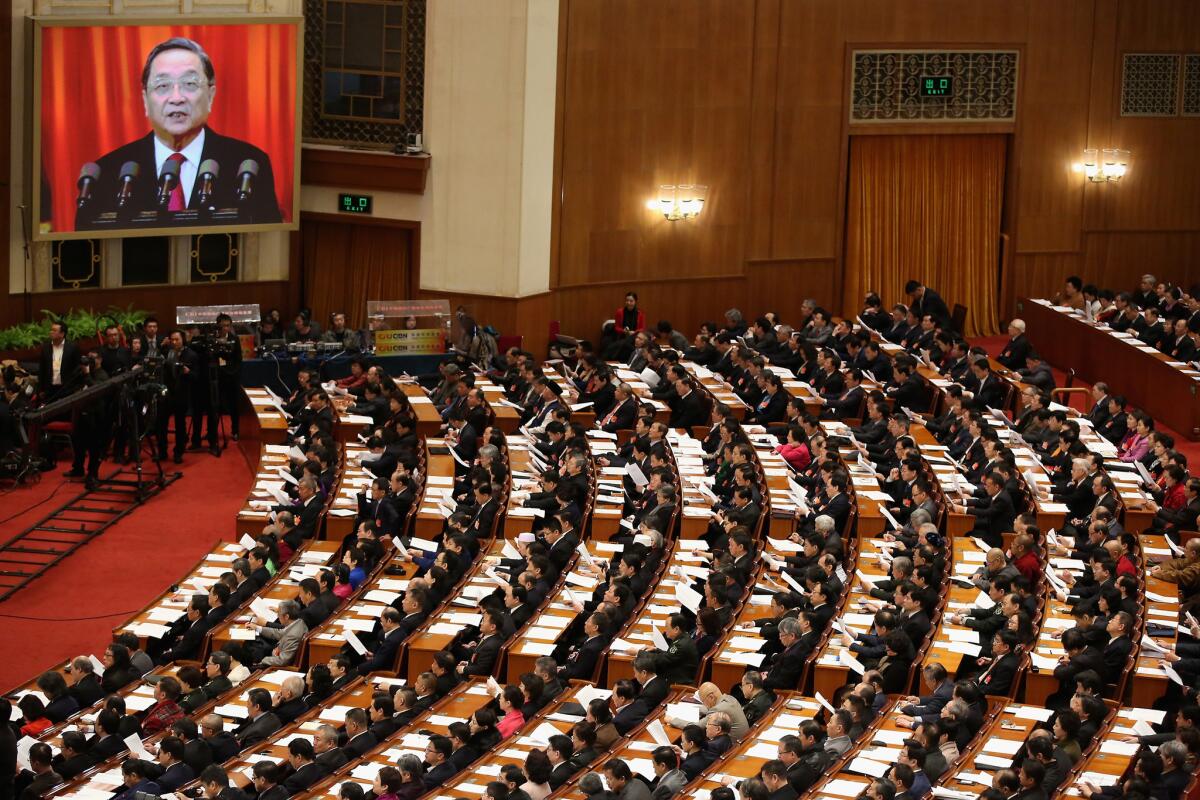In Beijing, political pomp abounds as China kicks off ‘two meetings’

China began its annual political high season on Tuesday with pomp and circumstance at Beijing’s Great Hall of the People. President Xi Jinping and more than 2,000 delegates -- including former basketball star Yao Ming -- convened for the opening session of the nation’s top legislative advisory body.
On Thursday, the Communist nation’s rubber-stamp parliament, the National People’s Congress, will begin its yearly session.
Though the chairman of the Chinese People’s Political Consultative Conference, Yu Zhengsheng, invoked the words “democracy” or “democratic” 48 times in his lengthy opening speech Tuesday, the “two meetings,” as they’re colloquially known in Chinese, are largely scripted events without meaningful debate over legislation.
Still, the dual sessions do telegraph the general national agenda for the coming year. During the 12 days of events, officials will reveal the nation’s gross domestic product target for 2015 and its military budget.
Other hot topics will include efforts to reduce pollution, the Communist Party’s continuing anti-corruption campaign, how to deal with the slowing economy and reform of state-owned enterprises.
The CPPCC, which began its session Tuesday, has no law-making authority; its ostensible purpose is to advise the nearly 3,000 members of the National People’s Congress. The 2,153 delegates at the gathering are drawn from a variety of occupations, ethnic groups and backgrounds. The official New China News Agency describes the group’s function as to “unite people from different walks of the society.”
Other members include actor Jackie Chan; film director Chen Kaige; Robin Li, chief executive of Chinese search engine Baidu; and Yang Yuanqing, chief executive of PC-maker Lenovo.
Members are encouraged to put forth their ideas for the nation. Li, for example, has gone public with a suggestion for a “China Brain” project that would boost research on human-machine interaction, big data analysis and prediction, automated driving, smart medical diagnosis, smart drones and robotics technologies for military and civilian uses.
The Hurun Report, a Shanghai-based organization that tracks China’s ultra-wealthy citizens, issued a report this week that found 97 members of the CPPCC and 106 members of the National People’s Congress were ranked on Hurun’s list of the top 1,271 richest Chinese. The combined net worth of those members, Hurun said, was more than $460 billion.
The start of the “two meetings” also provides an opportunity for state-run media to tout the leadership of Xi, who has rapidly consolidated power since assuming the helm of the Communist Party in late 2012.
This week, state-run media organs are touting the president’s latest slogan, the “Four Comprehensives,” which the Communist Party leadership is embracing as sort of a loose manifesto around which to organize its focus for the coming years.
For the first two years of his leadership, the “Chinese Dream” -- a populist if nebulous motto linking the aspirations of individuals to the ambitions of the nation and, to be sure, the party -- was the catchphrase most associated with Xi. Now comes the quartet of “comprehensives,” which, though still vague, give a bit more direction to cadres.
The four dull-sounding arenas of action are: “comprehensively building a moderately prosperous society,” “comprehensively deepening reform,” “comprehensively govern the country according to the law” and “comprehensively be strict in governing the party.”
Though official propaganda organs have been touting the “four comprehensives” as a profound breakthrough, they essentially sum up some of Xi’s greatest challenges: Keeping growth on track while reorienting the economy away from heavy reliance on low-value manufacturing; continuing to open up China to market forces and reforming state-owned enterprises; cleaning up the deeply flawed legal system; and rooting out corruption among Communist Party officials.
Follow @JulieMakLAT for news from China
More to Read
Start your day right
Sign up for Essential California for news, features and recommendations from the L.A. Times and beyond in your inbox six days a week.
You may occasionally receive promotional content from the Los Angeles Times.







